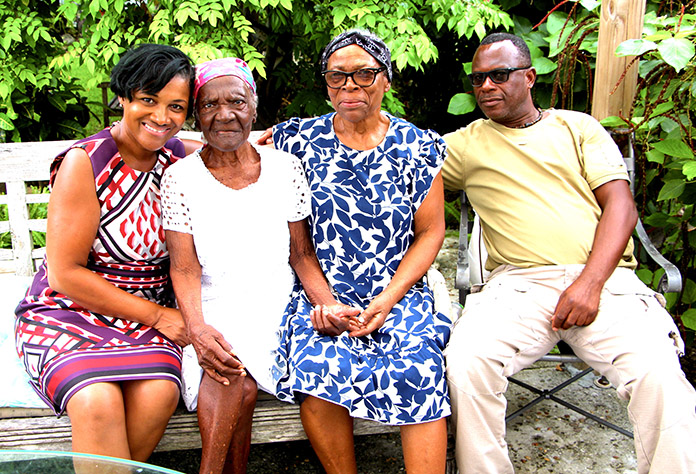
NASSAU| The oldest known living Bahamian, Matilda “Millie” Rolle-Robinson, has held the same self-belief all of her life. As far back as she can remember, from her childhood days, Millie said she was always well cared for. Her nicknames were “lil ting”, “God’s angel”, and “Doonga”, and she always knew that she was deeply cherished. Even now, 109 years later, Millie tells me she still doesn’t have to “lift a finger” and she is showered with love and care.
This may very well be the secret to her life’s longevity. Millie says she has never worked a da in her life. Whereas every human being must put in efforts to achieve certain goals – such as having a home, a family, and taking up hobbies, Millie has never looked at anything she has ever done as work. She has always been her own boss, and she says she has never had any stress.
Millie was born in Black Point, Exuma on August 19, 1914. She recalls a life of freedom, enjoying her days with just God and nature as she fished in the sea and the creeks in Exuma. “Ohhh, they treat me good,” she said.
“Everywhere I go, they treat me good. All my life, I didn’t do nothing (work) from I born and I’m a
hundred and how much now?”
Her daughter Curley Robinson-Williams said: “Mummy you are a hundred and nine years old, almost 110.”
Millie reacted with surprise, asking Curley if she’s sure that she’s not 113 or maybe 111 by now. She accepted that she would be turning 110 in a matter of weeks, pointing out that she can’t remember too much now. Curley said her memory is strong at some points and weaker at others. However, it seems that when you’ve been around for more than a century, there are some things that are simply much more important than others for the mind to recount.
What she hasn’t forgotten is the golden rule: “Do unto others as you would have them do unto you.” She uses every opportunity when conversing with others, to remind them of the significance of this rule.
Millie also says consistently: “Manners and respect will take you through the world!” “People, whether you know them or don’t know them, speak to them. You never know who will pick you up. Look at me and how long I’ve been here. A hundred and how much?”
Millie’s parents Isaac Rolle and his wife Isadora “Mama Doon” Rolle (nee Wright) brought her up well.
“From when I was a baby I remember,” Millie said, “A lot of love and care; I grew up on good manners and respect.” When asked about island life in Black Point, Millie said in the most positive way: “Island life is alright.”
When other children her age was attending school, Millie said her parents had “hell” to get her to go to school. Instead, she would spend her days going to “the point” to go fishing with “top string”. This kind of freedom, avoiding the rigor of formal education, allowed her to tune in with nature. When she wasn’t taking the slow journey over sharp, treacherous rocks to the point to fish, she would wade in the creeks and fish there.
“I used to go fishing plenty,” she said. “I used to go fishing me one (by myself)! I used to catch long fish.” She enjoys eating jack fish, snappers, grunt, turbot and even barracuda – but “only the blue skin ones”. She stopped eating turbot after learning that they have a monthly cycle like that of a woman’s. She does not enjoy stewed fish, boiled fish, or any kind of boiled food. She prefers just fried fish. She also recalls enjoying lots of native fruit on the island. She says that visitors came from near and far to the settlement of Black Point.
One day, a girl in her village named Earline slipped and fell on sharp rocks on her way to the point to go fishing. Millie said Earline hit her head, and that fall led to her demise. Because of that, she never went fishing alone again.
Although she didn’t go to school, when the children came from school, Millie would learn from them. She could read, write and count money better than her peers, she recalled. She was also responsible and therefore, she helped to raise countless children, not only in Black Point, but the neighbouring villages such as Steventon.
“I can’t remember much, but I wasn’t unruly,” she said. “I know that I was respectful and I could talk to anybody. I used to tend to the children; teach them how to live their life. Manners and respect take them around the world. I used to have a tamarind switch for the children. When they see me coming they call out, ‘Aunt Millie coming with the switch!’ I took care of everybody’s children. Some children today have no manners neither respect.”
Millie was also loving with the children. She would get up early and bake bread rolls for them on the way to school. They would stop by for their hot fresh rolls from her, free of charge, and she would send them on their way with a good word.
She never needed to work for money. She was raised in a loving home, and her parents had a farm, as most islanders did. She had access to fresh produce and she would catch her fish, and that was all she really needed.
As she grew, she got hooked on chicken wings – something she still enjoys to this day. However, if the food is not fixed to her liking, she refuses to eat it. Fish and chicken, she advised, must be marinated in a solution of water, sour (lime), salt, and pepper. Then, they must be squeezed dry prior to frying. She said that simply putting the seasoning on the meat and frying will never allow the seasonings to penetrate the food. She only eats rice once per week – on Sundays – usually provided by her grandnephew Justin who “knows how to cook with taste” and is one of the few people she would eat from. Chicken wings, mashed potatoes and fried. plantain are about all she prefers to eat these days, and she still loves her morning coffee or sometimes tea.
Millie’s free spirit was also nurtured by her travels. She recalls traveling around the Family Islands. One of her first trips was to her grandmother Elna in Ragged Island. She is proud of her Ragged Island heritage. She used to dance a lot, and as she recalled it, she smiled and raised her hands showing how she would twirl and dance. She recalls her grandmother’s love and admiration, which cemented her self-awareness of her worth and value from a young age.
“I used to have my money but I never worked for it,” she said. “People used to bring it to me; I never worked in my life.”
“All of my people respect me,” Milli added, “Even now.”
She was well cared for before marriage, she had no need to work when she married, and after her husband, Albert Robinson died, her children took good care of her. Curley, her youngest girl, takes such good care of her that she prays every day for the Lord to give her strength and bless her for her dutiful love and care.
“Honor thy father and mother that thy days may be long,” Millie charged.
During her lengthy life’s journey, Millie recalls traveling freely, on her own, including visiting her brother Howard (aka Boobie), who lived in Green Castle, Eleuthera. She also remembers her brother Rufus, who continued to reside in Black Point until his adulthood. She had two older sisters.
Millie mothered six children – three boys and three girls: Roy Robinson; Bertie Robinson-Pierce; Rudolph Robinson; Curley Robinson-Williams; Patrick Robinson, and one who died as a baby.
She prides herself on the fact that they were all raised with manners and respect, and that her love and care extended beyond them to all people with whom she interacted. She wishes to see more of her extended family. She can always be found chilling out on Curley’s porch in Yellow Elder Gardens, through a quiet corner with a neighbourhood spirit, where Millie is the star.
Her grandson, Brian Pearce and granddaughter Sharmaine Stuart were also on hand for her interview. Because they are regular visitors, she knows them even though her vision has somewhat faded. She knows Brian by his laugh and walk. He said that every other week, he comes to the home to spend time with her. Sharmaine, she said, used to take her for drives and although she cannot see well, she enjoys what she can see in the change of scenery.
She is a sprightly, small woman with seemingly boundless energy. She still walks around for herself, although she may lean on the table or hold a post along the way. She feeds herself, and although her daughter helps her get dressed, she chooses what she wants to wear.
Every night, before she goes to sleep, Millie recites the Lord’s Prayer. She may not remember everything in her life, but that prayer is etched in her memory and lays on her heart each night.
Although she does not recall much about independence, she is proud to have received a medal from Queen Elizabeth II of England on the occasion of her 100th birthday.
She loves the country of her birth: “It’s good for me! I am in no way discouraged. I won’t go anywhere (else in the world). I will stay right here. I sit on my front porch and I spy out of my good eye. I live to myself.”
She said that being an independent nation is important, and shared great words of advice. To the nation’s leaders, she said: “As long as you govern, govern good. Do better. Show the children cleanliness and how to act to one another. Don’t show them the wrong way. Talk to the man up there, and mean it!”
To the pastors, she said: “They have to be clean because that’s a charge on them. If they don’t, they will have problems on their hands. If they don’t do the right thing, they will go straight to hell. They better be truthful.”
To parents, she said: “Teach the children to have respect!” “God will be with everyone,” she added. “He is the dealer. You can do what you want and say what you want; but that’s the man up there you have to look to.”
“Everyone knows Auntie Millie. People come from all over to see me.”
“If I die right now, God’s kingdom is gonna see me. I don’t talk nothing bad, I don’t do nothing bad. If you do bad, you ain’t looking to see God’s kingdom!”
By A. Felicity Darville
For the National Independence Secretariat







